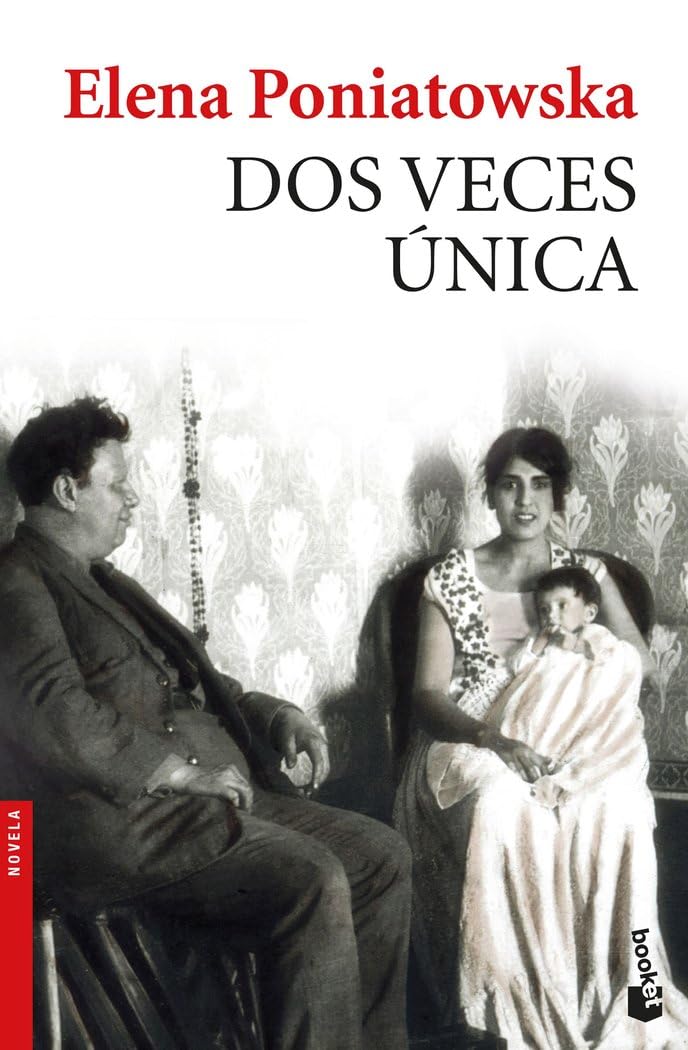The fictionalized biography of Lupe Marín, wife of the celebrated painter Diego Rivera and a key figure at the epicenter of the cultural and political whirlwind of post-revolutionary Mexico. A story as intense as it is personal, written with Elena Poniatowska’s unmatched mastery, and one that reads like the most captivating of novels.
Lupe Marín was an intense, provocative, and free woman who lived at the very center of the cultural and political hurricane of post-revolutionary Mexico. Hers is the story of a true protagonist who defied the molds of her time. In a world dominated by men and patriarchal structures, she managed to impose herself as a visible, polemical, and fascinating figure within the most influential artistic, political, and intellectual circles.
Born into a conservative family in Guadalajara, she grew up in a traditional, religious environment, but from an early age showed a strong and defiant character. Her striking beauty and intense personality set her apart from the women around her.
She married Diego Rivera and, besides being his muse and symbol, became the mother of two of his daughters, Guadalupe and Ruth. He was fascinated by her wild personality and singular allure. Lupe adapted to the bohemian and artistic life of Mexico City, entering into contact with the leading intellectuals, artists, and politicians of the time. She defended Diego fiercely in political meetings, even standing up to communist critics, but she soon discovered that the price of being beside a genius was abandonment, jealousy, and betrayal.
When Diego left, Lupe did not break. She married Jorge Cuesta, a brilliant and tormented poet, with whom she had a son, Antonio, but the relationship turned out to be even more complex than the previous one. She stayed with him until, devastated by mental illness, he died while institutionalized after a tragic suicide attempt.
Once again in contact with Diego, Lupe accepted an invitation to go to Paris, where she was welcomed as an exotic figure and muse by surrealist artists and intellectuals. There she experienced the recognition and admiration she had never felt in Mexico, and this stage marked her definitive social and intellectual consecration.
Back in Mexico, her life was marked by tensions with her daughters and the control she tried to exert over them, with a mix of fierce affection and inexplicable rejection. Lupe became an uncomfortable, fascinating, and excessive figure. She clashed with doctors who voiced opinions about her health and that of her loved ones, with communists, and even with the Church. Throughout her life, she actively participated in the political and cultural life of the country. She attended political meetings, debated with poets and critics, and intervened in public events where political decisions—or mere discussions about art—were at stake. She wrote her novel La Única, in which she harshly portrayed Diego, Cuesta, and the Mexican art world. The book provoked controversy and public attacks from writers such as Salvador Novo.
In her later years, Lupe revolved with her own force in the Mexican cultural scene. She was a central figure at the Casa Azul and a provocateur in circles of power. Her relationship with her children did not improve, and with her grandchildren, Lupe repeated her pattern: she favored some, despised others, raised them with shouts, yet also with sudden gestures of tenderness.
In her final years, already ill, Lupe finally accepted the care of her daughter Guadalupe, in a belated gesture of reconciliation. She died in 1983, never ceasing to be the same complex, brilliant, contradictory, and overflowing woman who had left her mark on everyone around her. Her legacy is not only that of having stood beside famous men, but of having been—until the end—a unique woman.
RELEVANT INFORMATION: Elena Poniatowska was born in Paris in 1932, but moved to Mexico when she was only nine years old. Her career began in journalism. She has been awarded the National Prize for Linguistics and Literature in 2002, twice the Mazatlán Prize, the Xavier Villaurrutia Prize, the Alfaguara Prize, and the Rómulo Gallegos Prize. Her work has been translated into more than a dozen languages, and her trajectory as both journalist and writer has been recognized with multiple national and international awards. In 2013, she received the Cervantes Prize.
In Twice Unique, Elena Poniatowska narrates the intense life of Lupe Marín, legendary muse and exceptional witness of the artistic world in 20th-century Mexico. The author has transformed thorough research into a novel: a story told by its actors over decades, along with essential documentation that sheds light on and reconstructs an existence full of passion and fury.
The plot offers an intimate, polyphonic portrait of legendary figures such as Diego Rivera, Frida Kahlo, Jorge Cuesta, Trotsky, and André Breton, with settings that move from Mexico City to Paris, from the murals of the Palace of Fine Arts to the surrealist world of Europe. The dramatic tension is constant: intense relationships, conflicted motherhoods, madness, exile, ambition, power struggles, and a family legacy passed down through generations marked by art, abandonment, and the search for identity.
AUDIOVISUAL POTENTIAL: TV Series, Miniseries, Feature Film, TV Film.
AVAILABLE LANGUAGES: Spanish, Czech, Polish.

Adquirir los derechos
Para ponerte en contacto con nosotros completa el siguiente formulario y te responderemos en breve.
Error: Contact form not found.

